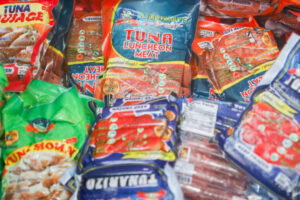THE PHILIPPINES will need more accredited certifying organizations to support the growth of halal exports, according to a United Arab Emirates-headquartered halal certification body.
In a chance interview last week, Prime Group Chief Executive Officer Mary Jane Alvero-Al Mahdi said that their company is the lone certification body for Philippine halal exports.
“There is a need to push for more certification bodies. Right now, we only have 10 or 11 for local, and then for international. It is only us,” Ms. Alvero-Al Mahdi told BusinessWorld.
“We need to have more certification bodies, and these must have the capacity to put up branches in the countries where they have a market,” she added.
She added that the certification bodies must also be accredited by the Gulf Cooperation Council Standardization Organization or by any other countries that have their own standards.
She said international accreditation has helped increase Philippine halal exports; however, she said exporters face higher costs when exporting to some markets.
“Now, in Qatar, aside from being halal-certified, (exporters) need to … provide a certificate of compliance (CoC) requirement,” she said.
“How you get this certificate is through a loading inspection. So, even though they already have a loading inspection in halal-conformity, there is still a requirement for a product-specific inspection,” she added.
She said the additional requirement has been costly to Philippine exporters, especially since there only two accredited certification bodies can issue a CoC.
The Philippines usually exports processed meat, which some exporters see as a challenge as some markets have specific requirements that are not required under Philippine standards, she added.
Early this year, the Department of Trade and Industry launched the Philippine Halal Development Strategic Plan 2024-2028 which aims to double the number of halal-certified products to 6,000.
The plan also hopes to attract P230 billion in foreign investment and generate 120,000 new jobs.
On Friday, the Department of Tourism opened the first Salaam Halal Travel and Trade Expo in Cubao, to highlight halal-certified and Muslim-friendly products, services, and tourism establishments.
Tourism Secretary Ma. Esperanza Christina G. Frasco said that the event helps bring forward President Ferdinand R. Marcos, Jr.’s ambition of building a reputation for the Philippines as a halal and Muslim-friendly destination.
“We are partnering with our halal certifiers, and we are continuing our efforts to expand the halal tourism portfolio of the Philippines,” she said.
“We saw that if we expand our halal and Muslim friendly tourism offerings, livelihood and employment opportunities will increase even more,” she added.
Malaysian Ambassador to the Philippines Dato’ Abdul Malik Melvin Castelino said that the expo will help put the Philippines on the map for Muslim tourism.
“Malaysia is ready to support the Philippines in this endeavor to, of course, ensure that we continue to grow this very lucrative and, of course, sustainable market,” he said.
“One last thing I’d like to say is that halal is for all. It’s not only for Muslims, but it’s also for every brother and every sector of the Philippines. So even those of the Catholic faith or the other faiths can also enjoy the food and the various products offered by the halal industry,” he added. — Justine Irish D. Tabile
